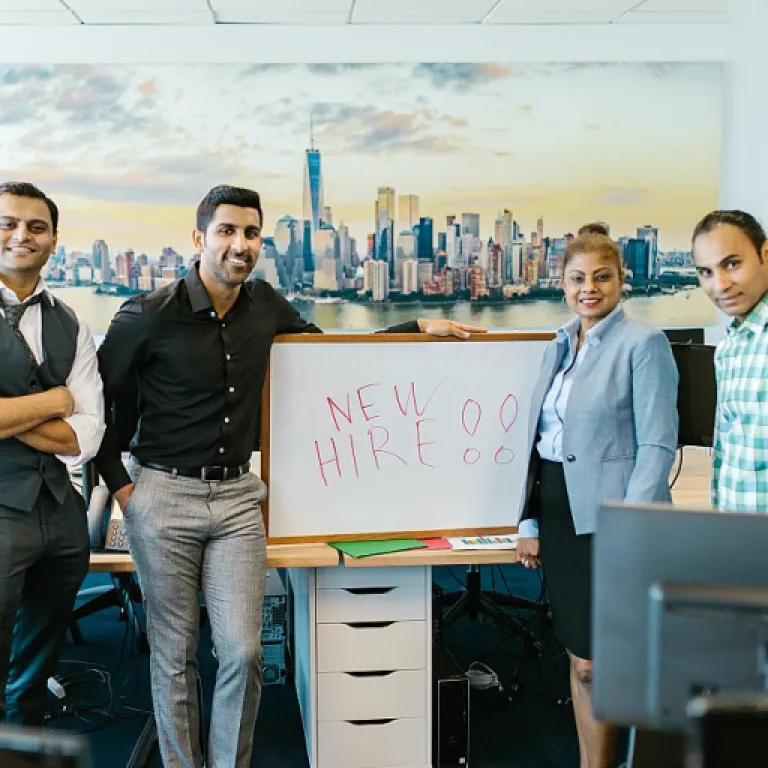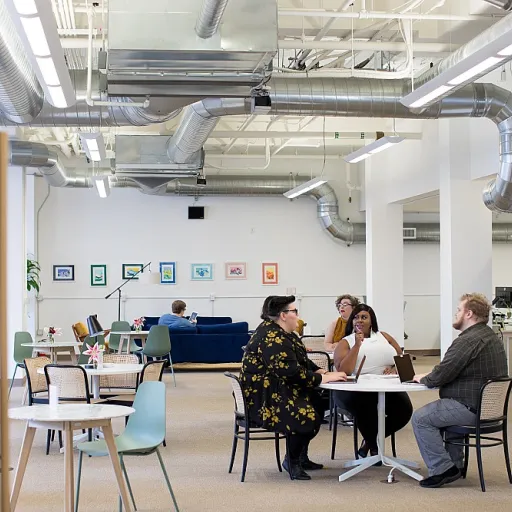
Understanding the evolving role of the chief human resources officer
The Chief Human Resources Officer: A Role in Constant Transformation
The chief human resources officer (CHRO) role has changed dramatically over the past few years. Once focused mainly on compliance and administration, today’s CHROs are at the center of business transformation, innovation, and strategic planning. This shift is driven by rapid changes in business trends, digital transformation, and the increasing importance of people-centric leadership.
In conversations with industry experts, it’s clear that the CHRO is now a key business partner, working closely with other leaders to shape the future of organizations. The role demands a deep understanding of trends shaping the industry, from artificial intelligence and intelligence automation to hybrid work and hyper personalization. These trends are not just buzzwords—they are reshaping how companies operate and how leaders approach talent management, coaching, and employee experience.
From Administration to Strategic Leadership
Years ago, the CHRO’s story was often about managing payroll, benefits, and compliance. Today, the focus is on driving innovation, supporting digital transformation, and fostering a human centric culture. The conversations happening over coffee between HR leaders and their clients now revolve around business trends, mental health, and the long term impact of remote hybrid work. Leaders are expected to share insights, love continuous learning, and embrace problem solving as they guide their organizations through change.
- Business acumen: Understanding how HR drives innovation and supports business goals
- People-first mindset: Prioritizing employee well-being and mental health
- Adaptability: Navigating trends innovation and digital transformation
- Strategic foresight: Engaging in strategic planning for the future workforce
These are just a few of the things shaping the CHRO career today. The industry expects leaders to be proactive, to anticipate change, and to build strong relationships through coaching and innovation conversations. For a deeper dive into how supply and demand dynamics are influencing HR leadership, explore this comprehensive analysis of HR leadership supply and demand.
As the business landscape evolves, so does the CHRO’s role. The next sections will explore the key business trends influencing HR leadership and the innovative tools and strategies that are redefining the profession.
Key business trends influencing HR leadership
Business Trends Reshaping HR Leadership
In today’s business landscape, the chief human resources officer (CHRO) role is being shaped by powerful trends and innovation. Conversations with industry experts reveal that the pace of change is accelerating, and leaders must adapt quickly. Over the past few years, several trends have emerged that are transforming how HR leaders operate and make decisions.
- Digital transformation is at the heart of many organizations. The rise of artificial intelligence, intelligence automation, and data-driven decision-making is changing the way HR teams support business goals. Leaders are expected to leverage these tools for strategic planning and to drive innovation.
- Hybrid work and remote hybrid models are now common. This shift demands new approaches to people management, coaching, and employee engagement. HR leaders must find ways to maintain a human centric culture while supporting flexibility and productivity.
- Hyper personalization in employee experiences is becoming a standard. Employees expect tailored support, learning opportunities, and benefits. This trend is pushing HR to adopt more innovative, people-focused strategies.
- Mental health and well-being have moved to the forefront. Businesses recognize that supporting mental health is essential for long term success. HR leaders are tasked with creating environments where people feel safe, valued, and empowered to share their story.
- Diversity, equity, and inclusion (DEI) are now business imperatives. Organizations are investing in effective DEI programs to foster transformation and innovation. For a deeper look at companies leading in this area, check out this resource on companies with effective DEI programs.
Innovation conversationswithjessica often highlight how these trends are not just buzzwords. They are real forces shaping the future of HR leadership. Leaders who embrace continuous learning, problem solving, and a love for transformation are better positioned to guide their organizations through change. The industry is moving toward a more human centric, business-driven approach, where coaching and meaningful conversations drive results.
As clients and leaders share their experiences over coffee or in formal settings, it’s clear that the CHRO’s role is evolving. Staying ahead of trends shaping the industry requires time, commitment, and a willingness to adapt. The story of HR leadership is one of ongoing transformation, driven by business trends and the relentless pursuit of innovation.
Innovation in HR: tools and strategies
Embracing Digital Transformation in HR
In today’s business landscape, digital transformation is not just a buzzword—it’s a necessity. The chief human resources officer (CHRO) role has evolved to include a strong focus on leveraging technology and innovation to drive people strategies. Conversations with industry leaders reveal that integrating artificial intelligence, intelligence automation, and hyper personalization are now central to shaping the future of HR. These tools are not only streamlining processes but also enabling more human-centric approaches to employee engagement and development.
Tools and Strategies Driving Innovation
Innovation in HR is visible through the adoption of advanced analytics, digital coaching platforms, and tools that support remote and hybrid work models. For example, many organizations are investing in platforms that facilitate continuous learning and mental health support, reflecting a shift toward long-term, holistic employee well-being. These trends are shaping how leaders approach strategic planning and problem solving, making it essential for HR professionals to stay updated on the latest industry advancements.
- Artificial intelligence: Automates repetitive tasks, enhances recruitment, and supports data-driven decision making.
- Digital transformation: Enables flexible work arrangements and improves communication across distributed teams.
- Hyper personalization: Delivers tailored learning and development experiences, increasing employee satisfaction.
- Intelligence automation: Streamlines HR operations, freeing up time for more strategic initiatives.
For a deeper dive into how these innovations are creating a more intelligent workplace environment, explore this resource.
Human-Centric Innovation: Lessons from Real Conversations
Through ongoing conversations, it’s clear that successful HR innovation is rooted in understanding people and their needs. Leaders share stories about how coffee chats, coaching sessions, and open dialogue with clients have led to breakthrough ideas. These innovation conversationswithjessica highlight the importance of empathy, continuous learning, and adaptability in driving transformation. The most effective CHROs are those who love to share their time and insights, fostering a culture where everyone feels empowered to contribute to the organization’s long-term success.
Challenges faced by chief human resources officers
Facing Complexities in a Rapidly Changing Landscape
Chief human resources officers today find themselves at the crossroads of business transformation and people-centric leadership. The pace of digital transformation, the rise of artificial intelligence, and the shift toward remote hybrid work models are reshaping the industry. These trends demand that HR leaders continuously adapt their strategies, often balancing long term strategic planning with the need for agility in the face of new business trends.
Balancing Innovation and Human Centric Approaches
Innovation is not just about adopting new tools; it’s about driving meaningful change for people and the business. Leaders must navigate the challenges of intelligence automation and hyper personalization, ensuring that technology enhances rather than replaces the human touch. In conversations with clients and peers, it’s clear that the most successful HR leaders are those who keep people at the center of every transformation, even as they embrace trends shaping the future of work.
- Mental health: Supporting employee well-being is a growing priority, especially as hybrid work blurs boundaries between personal and professional life.
- Continuous learning: The need for upskilling and reskilling is constant, with innovation conversations highlighting the importance of coaching and problem solving in adapting to change.
- Business alignment: HR leaders must ensure that their strategies support overall business goals, driving innovation while maintaining a human centric approach.
Time Pressures and the Demand for Strategic Vision
Many leaders share that time is one of their biggest challenges. Juggling day-to-day operations with long term transformation efforts requires careful prioritization. In coffee conversations and coaching sessions, the story is often the same: finding time to focus on strategic initiatives while responding to immediate needs is a constant balancing act. This is where continuous learning and problem solving become essential skills for future-ready HR leaders.
Learning from Real-World Conversations
Insights from conversationswithjessica and other industry voices reveal that the challenges facing chief human resources officers are as much about people as they are about technology. Whether it’s adapting to trends innovation or supporting mental health, the ability to listen, share, and love what you do makes all the difference. These real-world perspectives remind us that transformation is a journey, shaped by the things we learn from each other over the years.
Skills and qualities needed for future HR leaders
Essential Abilities for Modern HR Leadership
The chief human resources officer role is more complex than ever, shaped by rapid business trends and innovation. Today’s leaders must balance strategic planning with a human-centric approach, ensuring that transformation is sustainable and people-focused. Through ongoing conversations with clients and peers, several key skills and qualities consistently emerge as vital for success in this evolving industry.
- Strategic Thinking and Long-Term Vision: Navigating business trends and digital transformation requires a strong sense of direction. Leaders need to anticipate change, adapt strategies, and drive innovation that aligns with organizational goals.
- Continuous Learning and Curiosity: The pace of trends shaping HR, such as artificial intelligence and intelligence automation, demands a commitment to learning. Staying updated on innovation conversations and new technologies is essential for future-ready leadership.
- Problem Solving and Adaptability: As hybrid work and remote hybrid models become standard, HR leaders must solve complex challenges. Flexibility and creative problem solving help address issues like hyper personalization and mental health in the workplace.
- Coaching and Empathy: People remain at the heart of HR. Effective leaders invest time in coaching, fostering growth, and supporting mental health. These qualities build trust and drive transformation within teams.
- Communication and Influence: Sharing insights from innovation conversationswithjessica or coffee chats with colleagues helps spread new ideas. Strong communication skills enable leaders to influence change and inspire others.
Qualities That Drive Transformation
From years of industry experience and countless conversations, it’s clear that the most successful HR leaders are those who love to share their story and learn from others. They recognize that business and people are deeply connected, and that transformation is a journey, not a destination. Embracing a human-centric mindset, they prioritize the well-being of their teams while steering the organization through change.
As business trends continue to evolve, the ability to blend strategic planning with empathy and adaptability will define the future of HR leadership. Leaders who invest in continuous learning, foster innovation, and maintain a focus on people are best positioned to shape the future of the industry.
Insights from conversationswithjessica: real-world perspectives
Real Conversations: Lessons from the Field
In recent years, the chief human resources officer role has transformed dramatically. Through a series of coffee chats and coaching sessions with industry peers, several themes have emerged. These conversationswithjessica highlight how business trends and innovation are shaping the future of HR leadership.
- Embracing Digital Transformation: Leaders consistently mention the impact of digital transformation and artificial intelligence. Many clients share stories about integrating intelligence automation into their HR processes, which drives innovation and improves efficiency. The shift to remote hybrid and hyper personalization strategies has also become a central topic in these innovation conversations.
- Human-Centric Leadership: Despite the rise of technology, people remain at the heart of HR. Conversations jessica often focus on maintaining a human centric approach, especially when supporting mental health and well-being. Leaders love to share how they balance business needs with genuine care for their teams.
- Continuous Learning and Adaptation: The industry is moving fast. Many HR leaders emphasize the importance of continuous learning, problem solving, and strategic planning. They see these as essential skills for navigating trends shaping the business landscape, from hybrid work models to long term transformation initiatives.
Stories of Transformation and Innovation
One recurring story is about the challenge of adapting to new business trends while keeping people engaged. Leaders talk about the need for flexibility and the value of real-time feedback from their teams. They highlight how innovation conversationswithjessica have helped them identify gaps and opportunities for growth, especially in areas like intelligence automation and digital transformation.
Another theme is the importance of building strong relationships with clients and stakeholders. Through regular conversations, HR leaders gain insights into what drives innovation and how to align HR strategies with overall business goals. This approach not only supports the organization's transformation but also helps shape the future of the industry.
What Leaders Love to Share
Across all these conversations, one thing stands out: leaders love to share their experiences and lessons learned. Whether it's about navigating the complexities of remote hybrid work or implementing new coaching methods, these stories offer valuable perspectives for anyone considering a career as a chief human resources officer.
Ultimately, the insights from conversationswithjessica reinforce the idea that the CHRO role is both challenging and rewarding. By staying curious, embracing innovation, and focusing on people, future HR leaders can make a lasting impact in their organizations and the wider business community.













